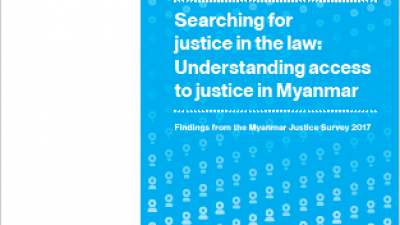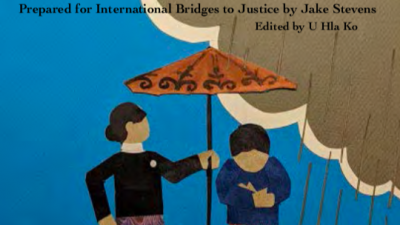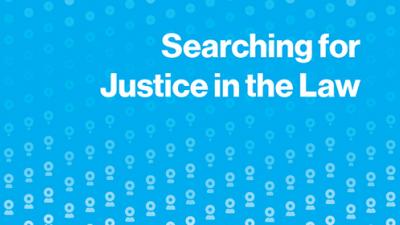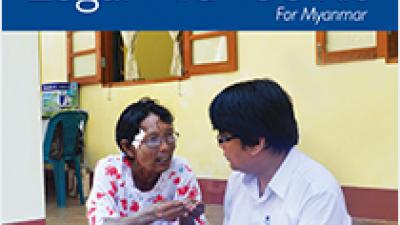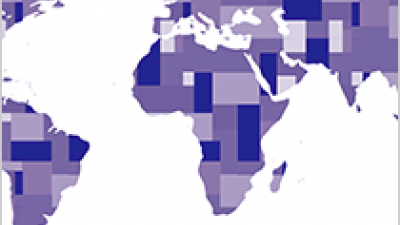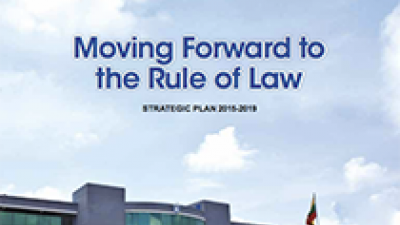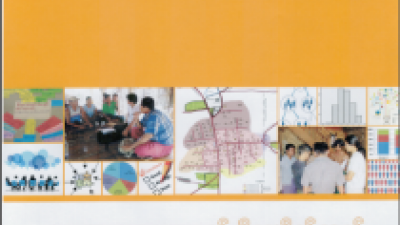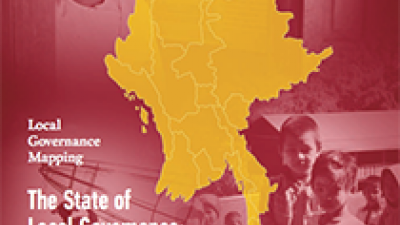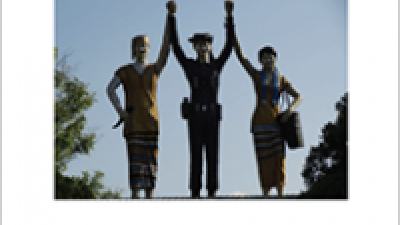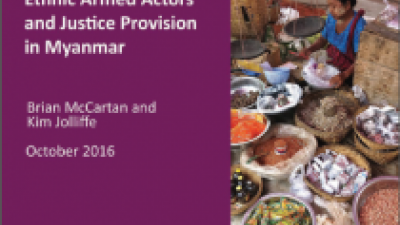-
MyJustice is pleased to release the full version of Myanmar Justice Survey 2017 (MJS). In 2017 MyJustice conducted the largest statistically significant survey on justice issues in Myanmar. 3,565...
Myanmar Justice Survey 2017: Full report
MyJustice is pleased to release the full version of Myanmar Justice Survey 2017 (MJS). In 2017 MyJustice conducted the largest statistically significant survey on justice issues in Myanmar. 3,565 people over the age of 18 were randomly selected for the survey from across all regions and states in Myanmar. Myanmar Justice Survey presents the main results of this nationwide survey.
-
Legal aid for the criminally accused is essential to ensure access to justice and rule of law, and Justice Centres provide free legal representation for poor and vulnerable people accused of crimes...
IBJ MYANMAR CRIMINAL DEFENSE PRACTICE MANUAL
Legal aid for the criminally accused is essential to ensure access to justice and rule of law, and Justice Centres provide free legal representation for poor and vulnerable people accused of crimes to fight against violations of fair trial and human rights. MyJustice partner International Bridges to Justice has published the Myanmar Criminal Defense Practice Manual, which provides practical analysis and advice for criminal defense lawyers in Myanmar to provide a robust defense on behalf of their clients. The Manual is part of an ongoing effort to build the capacity of legal professionals to defend the rights of the accused, create a fairer criminal justice system, and expand access to justice.
-
Myanmar Justice Survey 2017: Policy Brief
-
Legal Aid in Myanmar is at an important stage in its development. The Government of Myanmar recently enacted a Legal Aid Law, commnities and individuals are learning about the availability of legal...
USAID Legal Aid Toolkit for Myanmar
Legal Aid in Myanmar is at an important stage in its development. The Government of Myanmar recently enacted a Legal Aid Law, commnities and individuals are learning about the availability of legal aid, and legal aid providers are perfecting the skills needed to serve their clients. This Legal Aid Toolkit was prepared with the goal of educating and assisting Myanmar’s legal aid providers during this exciting transition.
-
This 2016 report combines expert interviews with national surveys to measure 44 indicators related to rule of law in 113 countries and territories. Myanmar ranked 14th out of 15 countries in the...
World Justice Project (WJP) Rule of Law Index
This 2016 report combines expert interviews with national surveys to measure 44 indicators related to rule of law in 113 countries and territories. Myanmar ranked 14th out of 15 countries in the region and 98 out of 113 globally. There is an interactive data explorer available here.
In February 2017 MyJustice hosted the WJP Executive Director and team for a discussion of the 2016 Rule of Law Index findings in Yangon. A short summary of the event is available here.
-
The Myanmar Union Attorney General’s Office published its first five year strategic plan in January 2016, available in English and Myanmar language. It focuses on four main areas: 1) to protect the...
UAGO Moving Forward the Rule of Law: Strategic Plan 2015 – 2019
The Myanmar Union Attorney General’s Office published its first five year strategic plan in January 2016, available in English and Myanmar language. It focuses on four main areas: 1) to protect the legal rights of individuals and the national interest; 2) to strengthen the performance of the Union Attorney General’s Office; 3) to inspire public trust and confidence in the justice system; and 4) to take an active role in justice sector reform.
-
The first edition of Inya Institute’s manual provides a comprehensive introduction to social science research for Myanmar audiences. The resource includes sections quantitative and qualitative...
Introduction to Social Research Methods by Inya Institute
The first edition of Inya Institute’s manual provides a comprehensive introduction to social science research for Myanmar audiences. The resource includes sections quantitative and qualitative research; survey design and sampling techniques; focus group discussion and interviewing; and data analysis, among others. It is in English and Myanmar languages.
-
This July 2015 report by UNDP combines 5,400 citizen report card responses, community scorecard dialogues at the village level, and key informant interviews to map the state of local governance in...
UNDP The State of Local Governance: Trends in Myanmar
This July 2015 report by UNDP combines 5,400 citizen report card responses, community scorecard dialogues at the village level, and key informant interviews to map the state of local governance in Myanmar, as well as public opinion on a range of topics. UNDP published an in-depth report for each State/Region, available here.
-
This August 2015 report collects responses from over 1,600 Myanmar people on economic conditions, social capital and trust, globalization, and a range of political and governance topics. The survey...
Asia Barometer Survey: Myanmar’s Political Aspirations and Perceptions
This August 2015 report collects responses from over 1,600 Myanmar people on economic conditions, social capital and trust, globalization, and a range of political and governance topics. The survey is conducted on a four year cycle, providing important snapshots of Myanmar public opinion through time.
-
Ethnic Armed Actors and Justice Provision in Myanmar
This October 2016 policy brief from The Asia Foundation sheds new light on justice provision by ethnic armed actors. Research into some of Myanmar’s most prominent Ethnic Armed Organisations and state-backed paramilitary organisations illuminates the various rule of law dynamics in their areas of influence.
